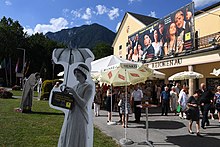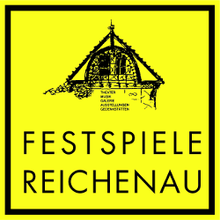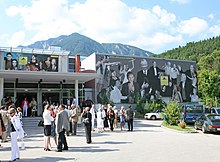Reichenau Festival
The Reichenau Festival is a theater festival that has been taking place every summer in July and August for five to six weeks in the health resort of Reichenau an der Rax ( Lower Austria ) since 1988 .
description
A special feature is the programmatic reference to Austrian poets of the 19th and 20th centuries, such as Arthur Schnitzler , Stefan Zweig , Hugo von Hofmannsthal , Karl Kraus , Franz Werfel and others. v. a. who stayed here in their own residences or hotels, especially in the summer, and who also worked here. This also applies to Johann Nestroy , who wrote the piece “ Umsonst! " wrote.
What is striking is the top-class cast of the plays with well-known artists from the major stages in Vienna ( Burgtheater , Theater in der Josefstadt ) as well as well-known actors from film and television.
The Reichenau Festival program includes at least four theater plays, new productions or commissioned works, such as new dramatizations of well-known prose works for the stage. A new literary format “Literature in Scene” is taking on a growing program focus. Musical highlights with recitals by famous soloists round off the festival program.
A dense, daily program offers over 120 performances annually for a total of around 42,000 visitors. It is part of the reputation of the Reichenau Festival that they are often sold out long in advance.
history
The Viennese summer guest Peter Loidolt founded the Reichenau Cultural Association in 1981 and subsequently the Reichenau Festival together with his wife Renate Loidolt in 1988 on their own initiative. The founding couple recognized the opportunity to win over the German-style directorial theater , which was cultivated by the Burgtheater director at the time, Claus Peymann , for an acting theater with a distinctly Austrian touch and local stars. With the support of the state of Lower Austria, a cultural pilot project was financed, the old theater was converted into a technically functional stage and continuously improved in the following years. Peter and Renate Loidolt run the festival as independent producers; every year they create the program, the artistic cast, give orders for new pieces and manage the constantly growing business in all artistic, organizational and financial facets under their own responsibility.
In 2020 the event was canceled due to the COVID-19 pandemic .
Peter Loidolt also designed the stage sets for the theater productions, Renate Loidolt is the managing director of Festspiele Reichenau GmbH. and as a dramaturge for the Reichenau Festival.
Venues
Reichenau Theater
The Reichenau Theater was built in 1926 as a “theater and concert hall” (Bmstrasse Alexander Seebacher, architect Heinrich Schopper ); subsequently used as a sound cinema, during the war and post-war period there was almost a standstill. After a period of guest performances and Boulvard summer theater, the house only flourished again with major renovations and expansions after the Reichenau Festival in 1988. Today the theater is fully air-conditioned and has 377 seats.
The new space
The “New Playroom” with its central, modern arena stage was added to the existing theater in 2005 on the initiative of Peter and Renate Loidolt (architects Franz Fehringer and Eduard Neversal). There are now two very different stages under one roof that can be used at the same time. The new game room has 312 seats and is also programmatically the "free spirit" in the annual program, where authors who do not fall into the traditional program line are also listed.
Venue Südbahnhotel Semmering (2000–2010)
The " Südbahnhotel Semmering ", a former palace hotel that has lost its splendor during the war years, but has retained the old style with a nostalgic atmosphere, was a third venue for the Reichenau Festival from 2000 to 2010. With specially adapted pieces and well-known artists, an extraordinary theater event was created here, which aroused a lot of attention and attracted visitors from home and abroad.
Remarkable pieces that are directly related to this house: “ The Last Days of Mankind ” by Karl Kraus ; “Affair Lina Loos”, “ Das weite Land ” or “ Traumnovelle ” by Arthur Schnitzler ; “ Die Strudlhofstiege ” by Heimito von Doderer or “ Das Konzert ” by Hermann Bahr . The private owner of the Südbahnhotel forbade any further use after 2010 because he wanted to sell the house.
Program line
New dramatizations of well-known prose works
The theater practice of dramatizing novels was still a rarity at the beginning in 2000, but is now used by many theaters. The Reichenau Festival, however, was among the first to adopt this fashion. Thus, the initial program focus with pieces by Schnitzler, Werfel Hofmannsthal, Nestroy and Raimund were supplemented from the year 2000 with arrangements of well-known prose works for the stage. In this way, authors like Stefan Zweig (inter alia with “ Schachnovelle ”), Joseph Roth (“ Radetzkymarsch ”), Thomas Mann (“ Zauberberg ”), Daniel Kehlmann (“ Fame ”), Heimito von Doderer (“ Demons ”) and many others other entry into the Reichenau festival program.
Expansion to include soulmate international poets and themes
Russian authors such as Turgenev , Chekhov and Gorky have been on the program regularly since 1998. The rural atmosphere of many of the pieces (" Onkel Wanja ", " The Cherry Orchard ", " Three Sisters ", "A Month in the Country", "Summer Guests" etc.) is particularly attractive to the audience in the thematically similar landscape of Reichenau.
Works by Ibsen have also been included in the program since 2010 (e.g. “ The People's Enemy ”, “ The Supports of Society ”, “ Master Builder Solness ”).
Other focal points
In the course of a continuous development of 30 years, not only other authors have been added for striking casts and productions (e.g. Dürrenmatt “ The visit of the old lady ” with Milva ; Thomas Bernhard “ The theater maker ” with Wolfgang Hübsch or “ The captain of Köpenick ”with Martin Schwab ), but also Nicolaus Hagg as a regular in-house author. In addition to the dramatizations of novels (eg “Doderer's Demons”), new plays such as “Colonel Redl” or “1914 - Two Paths to Downfall” were created.
Since 2012, the annual program focus "The fate of women in world literature" has proven to be particularly popular (the highest number of visitors of the season for "Anna Karenina", "Madame Bovary", "The cat on a hot tin roof", "Lady Chatterley" and others) ). As a result, more international authors came to Reichenau, especially from the Anglican-speaking area ( Tennessee Williams , DH Lawrence ).
In recent years, Renate Loidolt's “Literary Matinées” and the first actors have developed into a new literary format that goes far beyond staged readings through free play and opulent furnishings. Under the new name “LITERATURE IN SCENE”, this series will be continued as a matinée program with numerous performance dates (e.g. Stefan Zweig : Burning Secret , Amok or Joseph Roth : The wrong weight ).
organization structure
The cultural association
The starting point for the festival was the founding of the “Kulturverein Reichenau” in 1981 by Peter Loidolt, who has been chairman of the association ever since. Thanks to the initiative of General Secretary Renate Loidolt, it was possible to build up a membership of over 4,800 supporting members, theater friends from home and abroad, who are preferred when issuing tickets. Members' contributions and donations are the privately financed basis of the festival. There are no other major sponsors from business. The further growth of the cultural association is regulated by annual waiting lists.
The Reichenau GmbH Festival
The "Festspiele Reichenau GmbH" was founded in 1988 to hold the festival. The sole managing director is Renate Loidolt, Peter Loidolt is the artistic director of the Festspiele GmbH. The GmbH receives an annual gaming subsidy from the state of Lower Austria , as well as public funds to a lesser extent from the municipality of Reichenau and author funding from the Federal Ministry for Education, Art and Culture . The municipality of Reichenau has a 20% stake in the GmbH, 5% is held by the tourism association and 75% by the Reichenau cultural association. Festspiele Reichenau GmbH's profitability is stable at over 80%.
Publications and films
Self-published “The First Decade” in 1998 and “The Second Decade” in 2008. In 2018, Styria-Verlag published "So Do We Make Theater" - 30 Years of the Reichenau Festival, a documentary by Michaela Schlögl . An illustrated festival magazine “im spiel der sommerlüfte” has been published annually since 2003 with a circulation of 10,000 copies.
On the occasion of the 25th anniversary, the ORF made the film “Die Theatermacher - 25 Years Reichenau Festival”, which was broadcast on ORF 2 on the 2012 national holiday. On September 30, 2017, the Reichenau production "Lady Chatterley" was broadcast on ORF 2 .
Web links
Individual evidence
- ^ Doris Hotz: Festival in Lower Austria 1945-2009: Panorama of a festival landscape. Böhlau Verlag, Vienna 2010. ISBN 978-3-205-78300-8 .
- ↑ Manfred Wagner (Hg): Lower Austria: a cultural history from 1861 to today . Volume 1: People and Areas , Vienna a. a.) 2004, p. 317
- ↑ Reichenau Festival canceled. In: ORF.at . April 7, 2020, accessed April 7, 2020 .
- ↑ Michaela Schlögl, “This is how we do theater” - 30 years of the Reichenau Festival, Styria Verlag, will be published in June 2018 (listed in the Styria catalog at the end of November 2017). Pre-orders can be made from December at the festival office.
- ↑ Reichenau Festival - Great Hall , accessed on October 16, 2017.
- ↑ Reichenau Festival - New Playroom , accessed on October 16, 2017.
- ↑ Steininger-Mocnik, Theresa: The concept of the Reichenau Festival: origin, development and the genius loci. Dissertation. University of Vienna, 2017.




